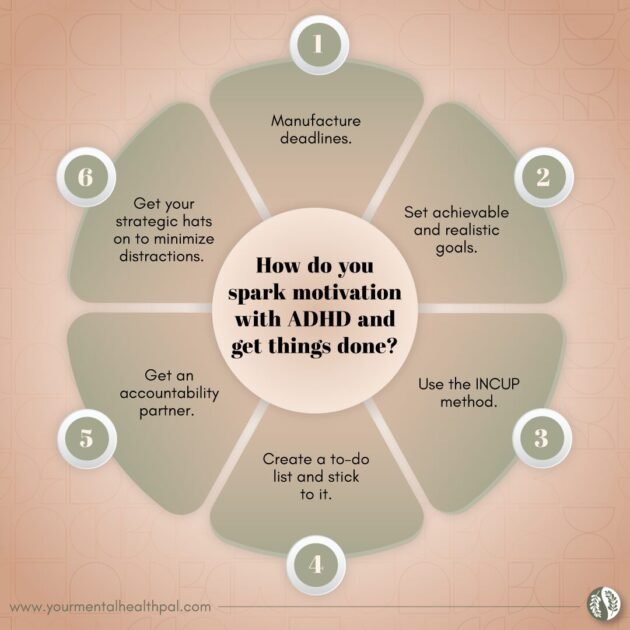If you’ve been diagnosed with ADHD, you know how hard it is to motivate yourself. Here is a complete ADHD motivation guide to help you get started.

Motivation and willpower are limited resources. It affects almost every aspect of our lives – from work, daily routine, relationships, and much more.
It’s already hard enough to keep yourself charged throughout the day, but learning how to do that with attention-deficit/hyperactivity disorder (ADHD) is a different ball game altogether. While most people with ADHD are easily motivated and focused while indulging in tasks and activities they find interesting, completing tedious or routine tasks becomes an ever-lasting challenge.
This connection between ADHD and low motivation is often deemed as laziness. However, that’s as far from the truth as possible. The ADHD-motivation relationship is at the root of the condition and is one of the most common symptoms of ADHD. And to combat this, people with ADHD are constantly looking for activities that give them the much-needed boost of dopamine. But even the most exciting activities get mundane after a time. Eventually, initiating any task becomes a challenge for you.
Therefore, unraveling the relationship between ADHD and ‘no motivation’ is the best way to understand the problem.
In this blog post, we will dive deeper into the ADHD-motivation relationship and understand the scientific connection between the two. We will also look at the most effective ADHD motivation tips to help you ignite your inner spark and get things done.
Does ADHD Cause A Lack Of Motivation?
The answer to this question is multifaceted and complex, just like the ‘ADHD-motivation relationship. The presence of ADHD is linked to a shortage of specific types of motivation and not all.
But what are the different types of motivations in the first place?
There are three types of motivation – intrinsic, extrinsic, and amotivation. Intrinsic motivation is the inner desire to indulge in a specific activity for personal gains. Here, the person is motivated by the challenges or excitement of a task rather than extrinsic factors. For instance, babies show intrinsic motivation when they pick and throw different objects around the room.
Extrinsic motivation is defined as the condition in which any activity is performed to achieve a goal. Amotivation is a state of absence of both intrinsic and extrinsic motivation.
A Polish study published in Child Psychiatry and Human Development (2021) showed that people with ADHD generally ranked higher in amotivation or extrinsic motivation and the lowest when it came to intrinsic motivation. This means that people with ADHD require higher motivation to change habits and complete tasks.
Another research from America (2020) found that children with ADHD had lower motivation to perform academic tasks when compared to neurotypical (children without ADHD) in all three departments.
But Why Does ADHD Cause Low Motivation?

The ADHD-motivation relationship was not something that medical science explored initially. A lack of motivation wasn’t even among the listed symptoms of ADHD. But as brain-imaging and scanning-related technologies grew, a greater understanding of brain chemistry emerged.
The relationship between ADHD and ‘no motivation’ is caused by the following factors:
1. The Dopamine Problem
Dopamine is a neurotransmitter that governs the brain’s internal reward system. It makes you feel focused, motivated, and happy. To top it off, it also handles sleep patterns, behaviors, mood, motivation, and much more. If you feel that sounds a lot like all the things that people with ADHD have trouble with, you are on the right track.
Dopamine is an important chemical and plays a massive role in keeping your brain in order. However, research published in Neuropsychiatric Disease and Treatment found that people with ADHD have differences in brain chemistry, which affects the dopamine reward cycle. Due to these differences, it is more challenging for the brain cells to respond to dopamine.
2. Getting Overwhelmed Easily.
Apart from differences in brain chemistry, the ADHD and low motivation relationship is also fueled by the tendency to get overwhelmed easily. This means they usually give up when they are at a crossroads with a challenge.
These tendencies are rooted in the symptoms of ADHD – hyperactivity and distraction. With everything making them either distracted or hyperfocused on something else, it feels easier to throw the towel and give up.
How Does The ADHD-Motivation Dynamic Reflect In A Person’s Life?
ADHD affects motivation in multiple ways. Here are the common ways in which the impact of ADHD on motivation is reflected in the lives of those associated with the condition.
1. Having Trouble Initiating And Indulging In Tasks.
As mentioned earlier, people with ADHD find it extremely difficult to initiate and keep doing a certain task. This can be fueled by the following reasons:
- trouble sustaining attention,
- inability to manage impulsivity, or
- difficulty maintaining focus for long periods.
For tasks that are specifically more boring and routine, the motivation dips even further, and it gets harder to reach the completion level. Additionally, people with ADHD might quickly abandon tasks after starting them, making it difficult to balance multiple projects.
2. Procrastination
Another common sign of the impact of ADHD on motivation is continuous procrastination of tasks. People with ADHD tend to leave tasks unfinished up to the last moment. This is caused by multiple reasons, including fear, doubt, imposter syndrome feelings, or because the task is simply not interesting enough.

Does ADHD Medication Help With Motivation?
If you have been dealing with ADHD-induced low motivation or any other symptom of the condition, it’s imperative to seek the right help. There are two common types of treatment lines for ADHD that can help deal with the lack of motivation.
1. Medications: ADHD medications can help with motivation. They include stimulants, believed to increase dopamine levels in the brain. People with ADHD report improved focus and less severe symptoms following the usage of stimulants.
2. Psychotherapy: Behavioral and psychotherapy-based interventions are also helpful in addressing ADHD-induced low motivation.
Is There Anything That You Can Do To Help Yourself?

A loud, resounding yes!
There are multiple effective ADHD motivation exercises and tips that can help you manage the struggles that come with motivation deficiency. Let’s dive deeper into them.
1. Manufacture deadlines.
One of the best ADHD motivation exercises is to manufacture extrinsic motivation. Deadlines are a sure-shot way to get over the hurdle of initiating tasks. If you rely on the natural deadline, you’ll only be able to complete as much. It will not give you the time to give final touches to your work, and you will mostly do a half-hearted job.
Therefore, if you want to overcome ADHD motivation woes and really want to get things done, manufactured deadlines are your best bet.
2. Set achievable and realistic goals.
Setting achievable and realistic goals is one the best ADHD and motivation tips to get your life sorted. When you put a mammoth task in front of a person with ADHD, they are much more likely to get into a state of task paralysis and eventually give up. Additionally, starting a seemingly difficult task is even harder when fighting a lack of motivation.
Therefore, break your tasks into manageable chunks and set achievable goals for each part.
3. Use the INCUP method.
INCUP is one of the easiest and most effective ADHD motivation exercises. It helps you understand everything that can help motivate a person with ADHD. Here’s what INCUP stands for:
1. Interest – When you are interested in a task, you are more likely to engage. Therefore, try to make seemingly boring tasks more fun.
2. Novelty – Starting a new task is much easier than completing the one that’s half done. Therefore, take up new hobbies and tasks for the much-needed dopamine boost.
3. Challenge – Set a clear goal or challenge for yourself. Make sure it’s realistic and achievable (not too easy or complex). Make sure that when you actually reach the goal, you celebrate the victory.
4. Urgency – While this factor alone might not be beneficial, but combined with the rest of the methods, creating a sense of urgency using deadlines is one of the best ADHD motivation tips.
5. Passion – Take a deep dive into your interests and hobbies. Try to align your tasks with them to make them more interesting and manageable.
4. Create a to-do list and stick to it.
Writing what you need to get done in a day is one of the best ADHD motivation tips to help you organize your day and increase your productivity. However, it’s imperative that you only include a reasonable amount of things in your to-do list. An unending to-do list will only dip your motivation levels as the day progresses.
To increase the efficacy of your to-do list, try writing one line about why a particular task listed on your to-do list is important. This will provide you with a purpose to complete the task. Additionally, ensure that the first task on your to-do list is easy. An initial boost of confidence can go a long way.
5. Get your strategic hats on to minimize distractions.
The woes of ADHD motivation are closely linked with symptoms of distraction. Therefore, it is essential to get strategic about minimizing distractions around you. There are multiple apps and tools that can help you do the same. Noise-canceling earplugs, meditation apps, and focus techniques are some of your go-to strategies.
6. Get an accountability partner.
While all these methods listed above are effective ADHD motivation exercises, it’s critical to understand that the journey is extremely long and tedious. Therefore, having a partner whom you can trust is a definitive plus point.
Make sure to keep this person in the loop as you set your deadlines and goals. Having someone you can’t disappoint makes it easier to stick to your tasks.
Conclusion:
The ADHD motivation relationship has recently been the center of multiple research studies. It has been established that ADHD causes low motivation due to its symptoms and differences in brain chemistry.
While dealing with a lack of motivation is tough, there’s a lot you can do to help yourself. We hope this list of the best ADHD motivation exercises will help you get started in the right direction.
Struggling with motivation is just one of the many aspects of adult ADHD. To learn more about adult ADHD, click here.
To continue learning about ADHD and mental health, subscribe to Your Mental Health Pal.

